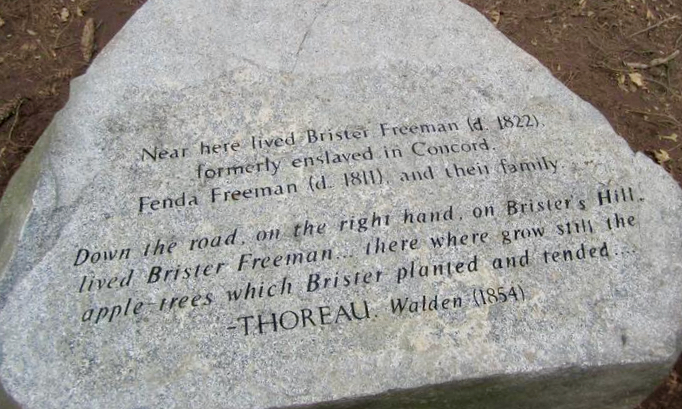A few hundred feet from Walden Pond in Concord, Massachusetts lies Brister’s Hill. If you follow the Thoreau’s Path trail you will come upon a stone marker with a quote from Henry David Thoreau, commemorating the life of Brister Freeman (1744-1822), after whom the hill is named.
Enslaved for twenty-five years, Freeman came to own land in Concord. Having gained his freedom after fighting in the Revolutionary War, he purchased an acre of “old field” in Walden Woods. There he lived with his wife, Fenda, and their three children, supporting his family as a day laborer. His wife told fortunes.
He was the second person of African descent to own land in the town. Yet, despite having gained his freedom and land ownership, Freeman endured frequent harassment from both residents and local officials. Ultimately, his land was taken from him by the town selectmen and redistributed among other landowners. Undeterred, Freeman continued living on what he considered “his land,” resulting in the townspeople calling what was once known as Stratton’s Hill, Brister’s Hill.
Thoreau wrote about Freeman in Walden more than thirty years after his death. His detailed notes and work as Concord’s town surveyor and geographical researcher revealed Freeman’s personal story.
The Robbins House, which commemorates Concord’s African American history, began researching Freeman in 2011. Seeking to honor his life and story, and that of other people enslaved in Concord, The Walden Woods Project installed a Toni Morrison Society Bench by the Road at Thoreau’s Path on Brister’s Hill in 2013.
At the dedication, Executive Director Kathi Anderson spoke of what Freeman meant to the Concord area and the importance of a having a tangible reminder of his legacy:
“The layers of Concord’s history are the fabric of our collective history as Americans,” Anderson said. “As we gather here today to recall the life of Brister Freeman, we also pay tribute to the often-forgotten men and women of African descent who lived in and contributed to this vibrant community in the 18th and 19th centuries or who journeyed through Concord on their way to freedom.”
The bench serves as a place to acknowledge and reflect upon all that Brister Freeman and other enslaved people in Concord endured and achieved within the community.
Photo courtesy of The Robbins House

